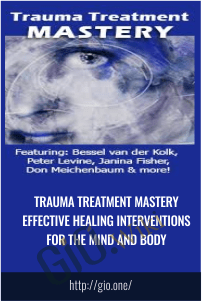Bessel van der Kolk, M.D,Peter Levine & others
About Author
Bessel van der Kolk, M.D.
After being traumatized, the body keeps pumping out stress hormones that make people feel frazzled, agitated, or shut down. Talk therapy alone doesn’t reset the limbic system, the part of the brain that creates a sense of fear and helplessness. In this session, you’ll learn how traumatic imprints can be addressed using techniques drawn from yoga, theater, and somatic therapy.
Bessel van der Kolk, MD, has been the medical director of The Trauma Center in Boston for 30 years. He’s a professor of psychiatry at Boston University Medical School and the director of the National Center for Child Traumatic Stress Complex Trauma Network. He is the author of the best-selling book, The Body Keeps the Score: Mind, Brain, and Body in the Healing of Trauma.
Peter Levine, Ph.D.
One of the keys to helping clients move beyond trauma is helping them learn how to access safety and positive resource states instead of repeatedly experiencing threats that no longer exist. In this session, we’ll focus on specific tools for reading clients’ psychological and physical cues and using their natural instincts to heal and rebalance their physiology.
Peter Levine, PhD, is the developer of Somatic Experiencing. He’s written a variety of books, including Waking the Tiger and In an Unspoken Voice. He’s the recipient of the USABP lifetime achievement award for his contribution to trauma.
David Grand, Ph.D.
Symptoms of unprocessed trauma—including dissociation, numbing, and chronic anxiety—are notoriously difficult to eliminate through talk therapy since the overwhelmed brain is unable to process verbal information about the events. But Brainspotting, a brain-based method of clearing trauma blockage without clients having to talk about it, nurtures their capacity for natural self-healing.
David Grand, PhD, is the founder and developer of the groundbreaking brain-body based Brainspotting method. Through his Brainspotting Trainings, Inc., he has trained over 8,000 therapists internationally. Dr. Grand is the author of the acclaimed book, Brainspotting: The Revolutionary New Therapy for Rapid and Effective Change and the co-author of This is Your Brain on Sports. Dr. Grand is in demand as a lecturer on a variety of topics. He has accomplished breakthroughs in performance and creativity with his Brainspotting sports work and Brainspotting acting and singing coaching.
Janina Fisher, Ph.D., Donald Meichenbaum, Ph.D., Mary Jo Barrett, MSW, John Briere, Ph.D.
In this trauma forum, you'll learn fresh perspectives on how our basic understanding of trauma has developed since PTSD first became accepted as an official diagnosis 30 years ago. Get insight into powerful treatment methods, including somatic interventions, CBT and the family trauma therapy model.
Mary Jo Barrett, MSW and Linda Stone Fish, MSW, Ph.D.
When working with trauma cases do you often see clients go into flight, fight, and/or freeze? Do they yell at you, insult you, or leave the session? Are there times you find yourself angry at your clients or just downright don’t like them? Do you recognize your own flight, fight, and/or freeze response? Welcome to the messy, often confusing world of trauma treatment. In this workshop, you’ll explore practical in-session techniques as well as a framework to help you recognize what’s happening when things heat up and get intense.
Diane Poole Heller, Ph.D.While most therapists are sensitive to the hazards of retraumatizing clients by pushing them too far, too fast, what about the dangers of playing it too safe? When is too much risk avoidance a disservice to clients and an indication of the therapist’s overprotectiveness getting in the way of growth? In this workshop, we’ll look closely at how to understand clients’ threat threshold and establish an optimal pace in trauma recovery, drawing fully on their resilience and capacity for self-healing.
Diane Poole Heller, Ph.D.: At a time when psychotherapists trained primarily in the “talking cure” are increasingly recognizing the need to “read” clients’ nonverbal communications, particularly those buried in early attachment issues, Diane Poole Heller has been a leader in addressing the unconscious issues that clients are often unable to express.

![© GiO Wiki - Courses [BigData]](/assets/img/user_mobile.png)

